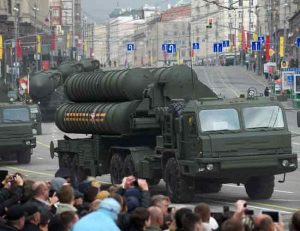By BORA BAYRAKTAR
Turkish President Recep Tayyip Erdoğan has declared that the Russian
S-400 air defense system will be delivered by July this year, and the cooperation with
Russia, including technology transfer, will continue as planned. The U.S. administration is trying to stop or slow down this process with promises, as usual. There is no concrete, genuine step taken by Washington to contribute to
Turkey’s defense, other than threats of not delivering the F-35 fighter jets whose production’s financial burden
Turkey is sharing.
The first question that comes to mind is “How can
Turkey trust this supplier, who is threatening not to deliver F-35s, and buy Patriots after canceling its purchase of the Russian S-400s?” The answer is clear:
Turkey cannot trust and depend on the U.S. under these circumstances.
The memories of the last days of the Ottoman Empire are still fresh in
Turkey. Ottomans had a similar problem with Great Britain, just before the break-up of the First World War. Istanbul was in close relationship with London, especially regarding the security of the Black Sea and the straits. In 1911, Grand Vizier Gazi Muhtar Pasha ordered two Dreadnoughts from Vickers Company, “Reşadiye” and “Sultan Osman.” The idea was to protect the Ottoman coast against the Greeks and Russians. On July 28, 1914 the Turkish delegation was faced with a surprise when they docked Britain to take the delivery of the ships, because on Aug. 3, the First Lord of the Admiralty Winston Churchill appropriated them. The idea was to keep
Turkey dependent on Britain for their naval defense and force the Ottomans to focus on building a strong land force against
Russia. Dreadnoughts Reşadiye, as Erin, and Sultan Osman, as Agincourt, joined the Royal Navy.
This caused a deep distrust between Istanbul and London. A few days later, when two German battleships Goben and Breslau chased by British ships entered Ottoman waters in the Aegean Sea, Enver Pasha allowed them to raise Turkish flags.
Later the two German ships joined the Ottoman navy with the names “Yavuz” and “Midilli” as substitutes to Reşadiye and
Sultan Osman.
The consequence of this incident was heavy not only for the Ottomans and Great Britain, but for the rest of the world. The Ottomans vanished from history after joining the world war along with Germany. Britain lost at least a million men and started to decline as a great power. Some 15 million people were killed in the Great War. The Ottomans may have disappeared, but modern
Turkey survived in Anatolia despite attempts to wipe it off the map.
After a century,
Turkey is in a similar crisis. In 2011,
Turkey’s allies since 1953 in NATO did not provide the air defense systems when
Turkey needed after the Syrian war broke out.
Turkey asked for Patriot systems against the missiles thrown from Syria. The U.S. rejected to sell Patriots. A late deployment did not satisfy
Turkey. In a way
Turkey was left defenseless by its allies against Syrian army, supported by
Russia.
Turkey had no options but to search for alternatives like China and
Russia. In March 2017
Turkey signed the
S-400 delivery agreement with
Russia.
The one responsible for this crisis is actually former U.S. President Barack Obama and the leadership of NATO at that time. President Obama and other leaders silently watched their ally
Turkey slide into existential dangers. Instead of a partnership based on equality, maybe they preferred a
Turkey serving only for the interests of their countries. For
Turkey this was not acceptable.
Of course the present situation is not ideal for Turkish-American relations. Obviously all deployment of
S-400 will expand and strengthen Russian A2AD area to Anatolia, eastern Mediterranean and the Black Sea. This will weaken NATO’s southern flank. In the long run, if the U.S. continues to alienate
Turkey, the division between them will deepen. If the F-35s are not delivered,
Turkey will probably look for their alternatives too.
Like a century ago, no one will be the winner of this crisis. The U.S., which has not been able to solve a single question in the Middle East (Afghanistan, Iraq, Iran, Palestine, Lebanon etc.) in the last four decades, will lose a very important partner and a strategic military operation center:
Turkey.
Turkey will move away from the Western alliance in which she has invested a lot. But for Ankara security and defense is a life and death matter, and
Turkey feels itself has to find its way out.
The seeds of disagreements between the two countries were planted by Obama. What is surprising is the insistence of Trump on these polices, who misses no chance in criticizing each and every policy of Obama’s.




